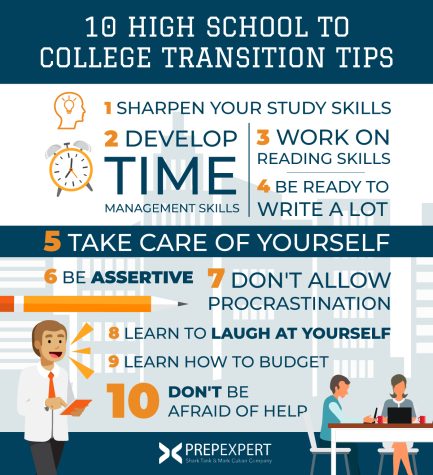The Difference and Transition Between High School and College
If You Want to Know the Differences Between High School and College, Here They Are:
April 6, 2022
As students, we are fully aware that time is ticking away and that our future is rapidly approaching. You’ll soon be in junior year, visiting and applying to colleges, and senior year is known as the “wake up call.” College isn’t for everyone, but for those who know about it or are considering it, this article will explain the differences between high school and college, as well as the transitions that come with it.
According to the articles, How Is College Different From High School? | Kings College and High School to College Transition | Lincoln Land Community College covers the following topics: class time, class size, teaching style, time management, homework, assistance, studying, testing, grading, graduation requirements, expenses, and responsibility.

Class Time
- HIGH SCHOOL: You spend on average 6 hours each day/30 hours a week in class, proceeding from one class to the next. The school year is 36 weeks long; with a short break in the spring and a long one over the summer.
- COLLEGE: You spend 12 to 16 hours each week in class, usually with breaks in between. Times are not limited to daylight hours, many classes are offered in the evening. In most cases, the academic year is divided into two 15-week semesters, plus a week after each semester for exams. There is generally a winter break and a spring break, which is followed by exams. The spring semester can conclude in early May.
Class Size
- HIGH SCHOOL: Classes generally have no more than 35 students and are taught by teachers.
- COLLEGE: Depending on the size of college you select, classes may range in size from twenty to hundreds of students. Classes are taught by professors, who will be referred to as Doctor if they have acquired a Doctorate in their chosen field. At large universities, classes may be taught by graduate assistants, not professors. According to the article, Much Ado About Class Size by Colleen Flaherty it states, “Small class sizes were fewer than 25 students, medium class sizes were 26 to 30 students and large classes were 31 to 40 students. Extra large classes were 41 to 60 students, and oversize classes had more than 61 students.
Teaching Style
- HIGH SCHOOL: Teachers present material to help you understand the material in the textbook, often writing information on the chalkboard to be copied in your notes.
- COLLEGE: Professors may lecture nonstop, give you illustrations, provide background information, o r discuss research about the topic you are studying. You will be expected to be up to date on all assigned readings and be able summarize it, so good notes are critical.
Time Management
- HIGH SCHOOL: Your time is usually structured by others: administrators, teachers, coaches and of course, parents. Teachers carefully monitor class attendance.
- COLLEGE: You manage your own time. It’s up to you to get to class, do your lab work and study. Professors may not formally take roll, but they are still likely to know whether or not you attended, especially at smaller colleges where they will get to know you.
Homework
- HIGH SCHOOL: You will usually be told what you need to learn from assigned readings and teachers will remind you of assignments and due dates. They will check your completed homework.
- COLLEGE: Professors expect you to utilize the course syllabus (outline); which spells out exactly what is expected of you, when it is due and how you will be graded. It’s up to you to read and understand the assigned material; lectures and assignments are based on the assumption that you’ve already done so. Professors may not always check completed homework, but they will assume you can perform the same tasks on tests.
Assistance
- HIGH SCHOOL: Teachers will approach you if they believe you need assistance.
- COLLEGE: Professors are usually open and helpful, but expect and want you to attend their scheduled office hours if you need assistance. Students will also have resources like an Academic Skills Center or Writing Center at their disposal should they need it.
Studying
- HIGH SCHOOL: You are expected to read short assignments that are then discussed in class. You may study outside of class as little as 2 hours a week, and this may be mostly test preparation.
- COLLEGE: You are assigned substantial amounts of reading and writing which may not be discussed in class. You need to study at least 2 to 3 hours outside of class for each hour in class to keep up with the coursework.
Testing
- HIGH SCHOOL: Testing is frequent and covers small amounts of material. Teachers frequently conduct review sessions, pointing out the most important concepts. If you miss the test, makeup tests are often available.
- COLLEGE: Testing is infrequent (a particular course may have only 2 or 3 tests in a semester) and may cover large amounts of material. You are expected to organize the material to prepare for the test. Professors rarely offer review sessions, and when they do, expect you to come prepared with questions. Makeup tests are rarely an option; on exam day you need to be prepared and on time.
Grading
- HIGH SCHOOL: Good grades are based on the ability to comprehend what you were taught in the form in which it was presented to you, or to solve the types of problems you were taught how to solve. Courses are usually structured to reward a “good-faith” effort so consistently good homework grades may help raise your overall grade if test grades are low. In addition, extra credit projects are often available to help raise your grade.
- COLLEGE: Good grades are based on your ability to apply what you’ve learned to new situations or to solve new kinds of problems. You must do well consistently: grades on tests and papers usually provide most of the course grade. Unlike high school, first tests may account for a substantial part of your course grade and extra credit projects are rarely used to raise a grade.
Graduation Requirements
- HIGH SCHOOL: You may graduate as long as you have passed all required courses with a grade of D or higher.
- COLLEGE: You may graduate only if your average in classes meets the departmental standard – usually a 2.0 or C.
Expenses
- HIGH SCHOOL: In most cases, almost all of your living expenses are paid for. Your textbooks are likely provided at little or no expense and you are not required to own a computer. You need money for gas, special events, activities or trips.
- COLLEGE: If you live on campus, you will need to pay for housing and dining in advance of each semester. You will need to budget substantial funds for textbooks, which will likely cost at least $200 each semester. Most colleges require each student to have a computer, which can often be purchased through them at a reduced price. You will need money to meet basic necessities, so be prepared!
Responsibilities
- HIGH SCHOOL: Parents and teachers will remind you what your responsibilities are and guide you in setting priorities. You will no doubt be corrected if your behavior is out of line.
- COLLEGE: You’re now responsible for what you do and don’t do, as well as for the consequences of your decisions. In addition to studying, you will be expected to manage a budget, do your own laundry and learn how to live in a whole new environment without a lot of structure. Along the way, you will be faced with a large number of moral and ethical decisions you have not had to face previously. You must balance your responsibilities and set priorities.
Darien High School Students
Two students at Darien High School have their own opinion on the difference between high school and college. Abe Ocampo states, ” College is a different environment, you are in control of everything. Find an hobby or subject that you like, be social, and maintain good grades. The amount of work you put in, will pay off in the future. Additionally, know that everyone is in the same boat as you are within this transition.” Ellie Mueller also claims that, ” The difference between high school and college is the progression of social maturity and finding out more about yourself and what kind of career you want. College will be much more academically stronger and focused in supporting ur future goals in life which I am looking forward to.”

Summary
- College classes require increased self-monitoring.
- Increased independent studying is necessary.
- Students take responsibility for time management.
- Students must develop personal motivation for success.
- The responsibility for learning shifts from the teacher to the student.
- College attendance is a choice, not required like high school.
- You pay to go to college.
- Programs offer more choices and possible decisions.
- Establishing the attitude of a dedicated student becomes essential to success

